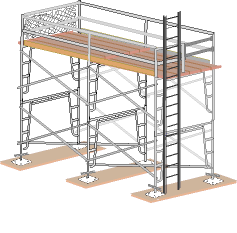Scaffolding Guildford: The Best Option for Your Building and Renovation Projects
Scaffolding Guildford: The Best Option for Your Building and Renovation Projects
Blog Article
Checking Out the Different Sorts Of Scaffolding Used in Building Tasks
The building and construction market relies greatly on different types of scaffolding to meet particular job demands, each offering distinct benefits and applications. Typical framework scaffolding gives a sturdy structure for general jobs, while suspended scaffolding is essential for job on skyscraper frameworks.

Standard Frame Scaffolding
Standard structure scaffolding is just one of the most widely made use of methods in the building industry due to its robustness and adaptability. This system consists of straight and vertical frameworks that are set up to produce a secure system for workers and materials. The main elements include upright messages, straight ledgers, and diagonal dental braces, which together give a strong structure that can support substantial tons.
One of the vital advantages of typical structure scaffolding is its versatility to various construction projects, ranging from residential buildings to big commercial frameworks. The modular layout permits easy assembly and disassembly, making it efficient for both lasting and short-term tasks. Additionally, the system can be customized in height and size, accommodating various building styles and site conditions.
Safety is vital in scaffolding applications, and standard framework systems are outfitted with guardrails and toe boards to avoid falls and guarantee employee protection. Regular evaluations and adherence to security regulations are vital in maintaining the stability of the scaffold (Scaffolding). On the whole, traditional framework scaffolding stays a fundamental selection in the construction market, supplying a trusted platform for labor and improving total task performance

Suspended Scaffolding
Suspended scaffolding uses an one-of-a-kind remedy for building and construction projects that need access to elevated surface areas, especially in scenarios where conventional framework scaffolding might be impractical. This type of scaffolding is usually put on hold from the roof covering or upper levels of a framework, using a system of wheels, ropes, and systems to create a functioning room that can be gotten used to different heights.
One of the main advantages of put on hold scaffolding is its adaptability. It can be easily repositioned or decreased to fit adjustments in building and construction needs, making it perfect for jobs such as home window installment, frontage work, and upkeep on skyscraper structures. Additionally, the minimal impact of put on hold scaffolding permits far better use of ground room in metropolitan environments, where space is usually minimal.
Safety and security is an important factor to consider in the use of put on hold scaffolding. Generally, suspended scaffolding supplies a efficient and effective service for accessing hard-to-reach locations in various building and construction situations, improving both efficiency and safety on site.
System Scaffolding
System scaffolding, often considered a modern service in the scaffolding industry, contains pre-engineered components that can be quickly set up and adjusted for numerous construction projects. Scaffolding. This type of scaffolding is identified by its modular design, which enables convenience and efficiency on task websites, suiting architectural requirements and different heights
Generally made from high-strength steel or light weight aluminum, system scaffolding offers improved resilience and security. The components consist of upright blog posts, straight journals, and angled dental braces, which adjoin securely, making sure a find here robust structure. The layout commonly integrates standard fittings, streamlining assembly and disassembly procedures, thus decreasing labor time and expenses.

Rolling Scaffolding
Rolling scaffolding is a flexible choice to standard set scaffolding, created for mobility and ease of use on building and construction sites. This sort of scaffolding consists of a platform sustained by frames with wheels, allowing workers to quickly move it as required. The mobility function significantly improves productivity, as it decreases downtime associated with putting together and taking apart taken care of scaffolding.
Normally constructed from lightweight products such as aluminum or steel, rolling scaffolding offers a tough yet portable option for tasks calling for frequent repositioning - Scaffolding. It is specifically beneficial in jobs such as paint, drywall installment, and electric work, where access find to various elevations and places is required
Safety and security is vital in rolling scaffolding design, with functions such as securing wheels to avoid unexpected movement when in operation, and guardrails to safeguard employees from drops. In addition, lots of designs are flexible in elevation, suiting various job demands.
Cantilever Scaffolding

The style of cantilever scaffolding generally entails utilizing braces or arms secured to a structure or framework, allowing the system to prolong outward securely. Security is vital; thus, these scaffolds must be engineered to endure different tons and environmental conditions. Normal inspection and maintenance are important to ensure architectural integrity and employee safety.
Cantilever scaffolding is preferred for its convenience and reliable use of space, making it a popular option in city atmospheres where room i loved this constraints prevail. Additionally, it promotes less complicated access to high altitudes, eventually adding to the overall performance of building and construction tasks. Similar to all scaffolding kinds, correct training and adherence to security criteria are essential for employees making use of cantilever scaffolding.
Verdict
Standard frame scaffolding offers stability, while suspended scaffolding supplies versatility for raised tasks. System scaffolding promotes fast setting up, and rolling scaffolding improves wheelchair for varying job environments.
Typical framework scaffolding supplies a durable structure for general tasks, while suspended scaffolding is vital for job on skyscraper structures.Moving scaffolding is a flexible option to standard set scaffolding, designed for mobility and simplicity of usage on construction websites. As with all scaffolding types, correct training and adherence to safety and security requirements are important for workers making use of cantilever scaffolding.
Typical frame scaffolding supplies security, while put on hold scaffolding supplies flexibility for raised jobs. System scaffolding facilitates fast assembly, and rolling scaffolding enhances wheelchair for differing job environments.
Report this page